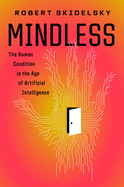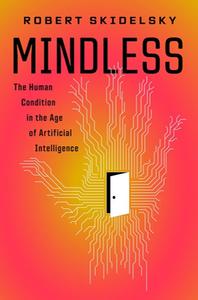
 It's almost impossible to visit any news source today without encountering stories about artificial intelligence. Many of those pieces are framed either in enthusiastic or apocalyptic terms, with historical or philosophical perspective often noteworthy for its absence. In Mindless, Robert Skidelsky helps to fill that gap with a thoughtful reflection on the role of technology in the development of Western civilization and its implications for humanity's future.
It's almost impossible to visit any news source today without encountering stories about artificial intelligence. Many of those pieces are framed either in enthusiastic or apocalyptic terms, with historical or philosophical perspective often noteworthy for its absence. In Mindless, Robert Skidelsky helps to fill that gap with a thoughtful reflection on the role of technology in the development of Western civilization and its implications for humanity's future.
Skidelsky, a life member of the House of Lords, is Emeritus Professor of Political Economy at the University of Warwick and the author of a prize-winning three-volume biography of John Maynard Keynes. He takes as his starting point Keynes's 1930 essay in which he predicted that the advance of technology would make it possible for his grandchildren to work only three hours a day. Nearly a century later, Skidelsky argues, Keynes's blithe optimism lives on in "techno-utopians" like Mark Zuckerberg and Elon Musk, who "preach escape from human to superhuman intelligence, from the earth to the cosmos," and who believe that even the most challenging problems facing humankind--from climate change to mass hunger--are susceptible to a technological solution. Skidelsky, clearly, is not so sanguine.
Comfortably displaying his erudition in disciplines that include history, economics, politics, philosophy, and literature, Skidelsky is as much at ease illustrating how "technology came with a rush with the onset of the 'capitalist' mode of production" as he is explaining how Mary Shelley's 1818 novel Frankenstein, or the Modern Prometheus "became a metaphor for the whole project of mechanizing human intelligence." He marshals his sources carefully to lay a strong foundation for his own skepticism about the views of those who assert technology's unfailing benignity, explaining that this crisp survey--one that brings to mind the work of writers like Yuval Noah Harari and Steven Johnson--is "primarily about how western civilization came to be captured by the dream of utopia through science and about the successive stages by which this dream turned sour."
Even as he points to the "continuing threat" of technological innovation to "rob ever-larger fractions of people of their employment, livelihood, status, skills, usefulness and identity, and finally make them redundant," Skidelsky recognizes that we are in the early days of a debate on a subject with profound implications for the future of humanity. His contribution with Mindless is one that should stimulate that debate, rather than stifle it, and anyone who wants to consider some of the fundamental questions that beg to be asked and answered will find it a useful starting point. --Harvey Freedenberg, freelance reviewer
Shelf Talker: Scholar Robert Skidelsky surveys the history of technology and reflects on its implications for the development of artificial intelligence.

